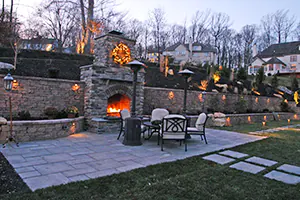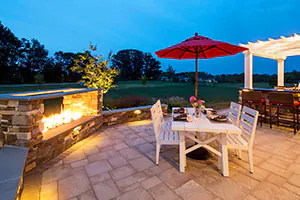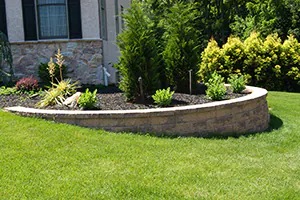Landscape Design in Media, PA
 Landscape design is a great way to enhance the beauty and functionality of your outdoor space. Whether you are looking to create a stunning garden, or a luxurious outdoor living area, or simply want to improve the look of your current landscape, B. DeMichele is here to help! The first step in landscape design is to create a plan. All of our customized plans include the types of plants, trees, and shrubs appropriate for your property, the size and configuration of your space, and any other elements you would like to include.
Landscape design is a great way to enhance the beauty and functionality of your outdoor space. Whether you are looking to create a stunning garden, or a luxurious outdoor living area, or simply want to improve the look of your current landscape, B. DeMichele is here to help! The first step in landscape design is to create a plan. All of our customized plans include the types of plants, trees, and shrubs appropriate for your property, the size and configuration of your space, and any other elements you would like to include.
Hardscaping Services Ask An Expert
Hardscaping in Media, PA
 Hardscaping involves the use of materials such as pavers, bricks, stones, and other hard materials to create a beautiful and durable outdoor living space. Hardscaping can include walkways, patios, decks, driveways, outdoor kitchens, outdoor fire pits, outdoor fireplaces, outdoor water features, and outdoor seating areas. Conveniently located in Media, PA, B. DeMichele is an expert in the area of hardscaping. You can be sure that we will use our many years of experience to ensure that your hardscaping will be beautiful and durable.
Hardscaping involves the use of materials such as pavers, bricks, stones, and other hard materials to create a beautiful and durable outdoor living space. Hardscaping can include walkways, patios, decks, driveways, outdoor kitchens, outdoor fire pits, outdoor fireplaces, outdoor water features, and outdoor seating areas. Conveniently located in Media, PA, B. DeMichele is an expert in the area of hardscaping. You can be sure that we will use our many years of experience to ensure that your hardscaping will be beautiful and durable.
Testimonials Get Started
Softscaping in Media, PA
 Softscaping refers to the living elements of your landscape design, such as perennial and annual plants, grasses, and trees. Here at B. DeMichele, we believe that a harmonious blend of hardscaping and softscaping is essential when it comes to creating compelling landscape designs.
Softscaping refers to the living elements of your landscape design, such as perennial and annual plants, grasses, and trees. Here at B. DeMichele, we believe that a harmonious blend of hardscaping and softscaping is essential when it comes to creating compelling landscape designs.
Full Services List Reach Out
Softscaping: Caring for Flower Gardens
Caring for a vibrant flower garden is achievable, but it does demand time and effort. Below are some tips to keep your flower garden happy and healthy.
-
The Three Necessities: Water, Sunlight and Fertile Soil
Your flower garden must have an adequate supply of water, sunlight, and fertile soil. Any lack of these basic necessities will affect your garden’s health. When it comes to watering and sunlight, the best approach is to heed the plant tag suggestions. During hot and dry cycles, it's acceptable to water more frequently, but excessive watering can lead to flower rot. Opt for watering at the base of each plant to avoid disease spread through overhead watering. It's beneficial to annually incorporate organic matter and fertilizer into your garden. This not only nourishes your flowers but also supports earthworms and microbes. However, it's essential to replenish these reserves to ensure a healthy garden for the following year.
-
Flower Selection
There are four types of flowers: annuals, biennials, perennials, and bulbs. Annuals typically grow and bloom for just one season. Biennials develop leaves and stems in the first year and produce flowers in the second year. Perennials and bulbs continue to bloom and grow for several years. A well-rounded garden can be achieved by mixing these four types of plants, ensuring ongoing blooming throughout the year. Swapping out annuals can also provide added interest, incorporating different colors and textures into your garden each year, complementing the backdrop of perennials.
-
Insects
The majority of insects play a beneficial role in your garden, though a few can be harmful. Insects like bees and butterflies serve the dual purpose of pollinating and fertilizing your flowers. As for the "bad" insects, it's important to identify them by the damage they cause, such as chewed leaves. When selecting an insecticide, opt for one that minimizes environmental impact and has the highest pest mortality rate, while sparing beneficial creatures.
-
Deadheading
Deadheading maintains the tidiness and continuous blooming of gardens. This practice involves snipping off the wilted flower head, creating space for the potential growth and blossoming of new flowers.
Softscaping: 10 Gardening Tips
-
Create Planting Beds with Ease
To create a new planting bed, slice the lawn area with a spade and flip it upside down. Next, cover the area with about 3 inches of wood chips. After a few weeks, the bed will be ready for planting.
-
Keep the Dirt and Soil Outside
To prevent soil from being tracked inside keep plastic shopping bags by your door. So, if you have to go inside you can cover your muddy gardening boots / shoes with them. Also, to prevent soil from getting underneath your fingernails scrape them across a bar of soap before heading to the garden. The soap will provide a seal. Once you are finished in the garden, use a nail brush to remove the soap.
-
Soil Amendments
For acid-loving plants such as rhododendrons and azaleas, an easy and cost-effective way to amend the soil is to sprinkle leftover coffee grounds over it. Applying about 1/4 inch each month during the growing season will help maintain the soil's low pH. Additionally, to prevent fungi from affecting newly planted seedlings, add a small amount of chamomile tea to the soil around the base of the plant once a week until the seedling matures.
-
Compost Creation
Compost can be created from the previous year's garden pathways. To achieve this, simply place three layers of newspapers within the walkways and cover them with a 2" to 3" layer of mulch or wood chips. By the following spring, you will have rich, dark compost ready to be added to the beds surrounding the walkways.
-
Water
Soaker hoses save you the time of standing with a hose or refilling a watering can. The water can be left on for several hours while a section of the garden is slowly getting irrigated.
-
Put Away the Hose
If you decide to use a conventional hose rather than a soaker hose for easy storage and faster access stationary and portable hose reels can be used. Also, you can create your own hose stand by putting a rod in the ground and covering it with two terracotta pots, the bottom one to be upright and the top one to be upside down.
-
Aphid Control
An easy and cost-effective way to remove aphids is to fill a spray bottle with half parts water and half parts dish soap. Spray the infested parts of the plant in the evening (to prevent leaves from burning in the sun and heat) with the dish soap mixture.
-
Weed Control
Use the “shovel method” to remove low-growing mat-like weeds. Wait until the weeds create a nice cover then splice them with a spade and bury the leaves in the soil. The rotted leaves will create nice compost.
-
Functional Weed Wacker
To prevent the line on your weed wacker from jamming or breaking, spray it with vegetable oil before installation.
-
Garden Markers
Use a permanent marker along with acquired flat faced stones to create labels for your plants within your garden.